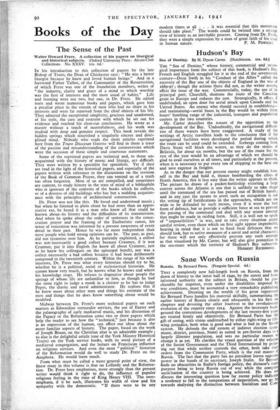Hudson's Bay
Sea of Destiny. By H. Dyson Carter. (Hutchinson. los. 6d.) THE "Sea of Destiny," whose history, commercial and strate- gical importance form the subject of this book, is Hudson's Bay, French and English struggled for it at the end of the seventeenth century—Dean Swift in his "Conduct of the Allies" called the recovery of the Bay one of the objects of England in the war of 1689-97; though the actions 'there did not, as the writer asserts, affect the issue of the war. Commercially, today, the use of its principal port, Churchill, shortens the route of the Canadian grain to Europe and reduces the cost. Strategically, it offers, if undefended, an open door for aerial attack upon Canada and the United States. An enemy who should succeed in establishing— and maintaining—aerial bases in the Bay would be within three hours' bombing range of the industrial, transport and population centres in the two countries.
Mr. Carter describes the nature of the opposition to the development of the Bay. Undoubtedly, the navigational difficul- ties of those waters have been exaggerated. A study of the writings of Arctic travellers leads to the conclusion that if the navigational facilities were developed the period during which the route can be used could be extended. Icebergs coming from Davis Strait will block the waters, as they do the straits of Belleisle, for about six months, but the use of the route for the rest of the year would be an advantage of which we should be glad to avail ourselves at all times, and particularly at the present, when it is necessary to put every ton of shipping to the best use and save expense in freights.
As to the danger that our present enemy might establish him- self in the Bay and hold it, thence bombarding the cities of North America, this is less easy than the writer appears to think. The picture he draws of a pocket-battleship escorting a large , convoy across the Atlantic is one that is unlikely to take shape until the command of the sea has passed out of British hands ; and in any case the means to avert such an occupation is not the setting up of fortifications in the approaches, which are too wide to be defended by such means, even if it were the best form of defence, but to provide a sufficient force at sea to prevent the passing of the command and deal with any minor attempt that might be made in raiding form. Still, it is well not to speak of " impossibilities " in war, and to take every situation under careful review, even those which on first sight appear improbable, bearing in mind that it is not to fixed local defences that we should look, but to active measures of a naval and aerial character; for these will not only effectively prevent any such attempt as that visualised by Mr. Carter, but will also give protection to the sea-route which the territory of Hudson's Bay subserves.
HERBERT RICHMOND.






























 Previous page
Previous page